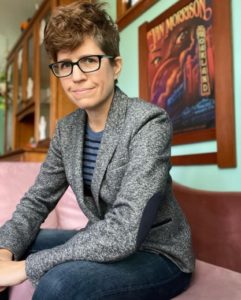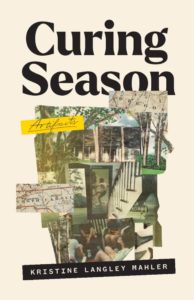
 Review by Laura Dennis
Review by Laura Dennis
The soundtrack is sometimes James Taylor, sometimes Nirvana. The flavors are Hot Fries and Moon Pies, consumed by middle school girls dressed in thrift-store grunge. Smells of pine and drying tobacco mingle with teenage sweat and Strawberry VO5. We are in Pitt County, North Carolina, mostly in the 1990s, but also in the distant past and the present day, following a girl-turned-woman upon whom four years in the coastal south have left an indelible mark that some might call a scar.
Although the time in question lies just outside the so-called formative years, form is everything in Kristine Langley Mahler’s Curing Season. In this memoir-in-essays, comprised of thirteen texts of varying lengths, the author excavates her memories, in keeping with the subtitle, Artifacts. These are shared in everything from a burn pile (“In the Burn Pile Behind the Old Nobles House”) to woven finger traps (“Mädchenfänger”) to neologisms (“Creepsake”). “Not Something That’s Gone” fittingly repurposes phrases from Margaret Atwood’s novel Cat’s Eye, while “Club Pines” tours the author’s old neighborhood house by house, girl by girl, memory by memory.
Curing Season does not proceed with any kind of fixed chronology, but rather jumps around in time, weaving among the author’s childhood, the present, and much earlier times. Throughout, certain memories surface repeatedly, not unlike the prehistoric shark teeth that used to wash up in the drainage ditch. Some involve her interactions with other girls, while others have to do with race, a particularly painful subject given the legacies of enslavement and the Civil War, not to mention the author’s recently desegregated middle school. The reader squirms uncomfortably alongside the author as she struggles to navigate the complex, awkward dance of exclusion and belonging, not only as a child, but also as an adult.
So much of belonging has to do with boundaries––who’s in, who’s out. Mahler literally recreates these boxes in “Shadowbox,” which explores the layers of meaning of the word, adding to the official definitions one of her own imagining: “to shadowbox is to swing at an imaginary foe.” Within each box are encapsulated short bursts of text, many of which contain fragmented memories of girlhood cruelty––there are moments when Mean Girls has nothing on this group.
Mahler pushes the boundaries of form even further in the extended five-part essay “A Pit Is Removed, a Hollow Remains.” It moves from a hermit-crab piece (“Excavation Report”) to a sort of braided essay with an extra twist––each weave, each strand is contained in a separate box (“Grafting”). Boxes reappear in the quilt-like “Piecing,” which juxtaposes episodes from Chronicles of Pitt County with information about the author’s life and family. “Replacing,” takes this act of (re)creation a step further, creating collages of personal artifacts (snapshots, yearbook pages, prizes) that are captioned with bits of text taken from the Chronicles. The piece concludes with a brief reflection entitled “Assessing” in which the author muses on her own role as both conveyor and concealer of truth.
Form and content complement each other throughout the book, laying bare the unreliability of memory, reminding us that history is always a construction, “a series of filtered facts.” Meaning shifts constantly; possible interpretations have no end. “Alignment,” which was named a Notable Essay in 2021’s Best American Essays, pushes this so far that one almost fears something––or someone––could break. As she connects seemingly far-flung dots, she declares, “I can find meaning anywhere. I will find meaning anywhere,” yet also admits, “It is exhausting making sense of myself.”
Sensory detail and evocative descriptions lend a lyrical touch to the collection, even when things get rough. Consider, for example, the alliterative imagery in this passage from “Grafting”:
When I could not claim kin-bones under the farmed-out fields, I felt irrelevant. I slowed my syllables, I swallowed sweet tea. I scraped my knees groveling for invitations, but it all remained on the surface, shallow scratches, a seed parching.
This last image begs the question––does the seed ever get watered? Does the author ever establish roots or ease her pain? One might think that in a text where so many meanings are stacked atop each other, the “curing” of the title might refer not just to processing tobacco, but also to healing as well. Perhaps it does. Then again, maybe not. To find out, read this thought-provoking, emotionally charged experiment in (re)constructing a place and a past, a story and a self.
Curing Season: Artifacts by Kristine Langley Mahler
West Virginia University Press 2022 $21.99 [e-book and paper]
ISBN 9781952271663 [e-book]; 9781952271656 [paper]
Laura Dennis is a college professor and co-editor of book reviews for MER. She has published book reviews and her own creative work in a variety of outlets, including MER Vox Quarterly, Still: The Journal, Change Seven, Bethlehem Writer’s Roundtable, Bluff & Vine, Northern Appalachia Review, and Kentucky Philological Review.
